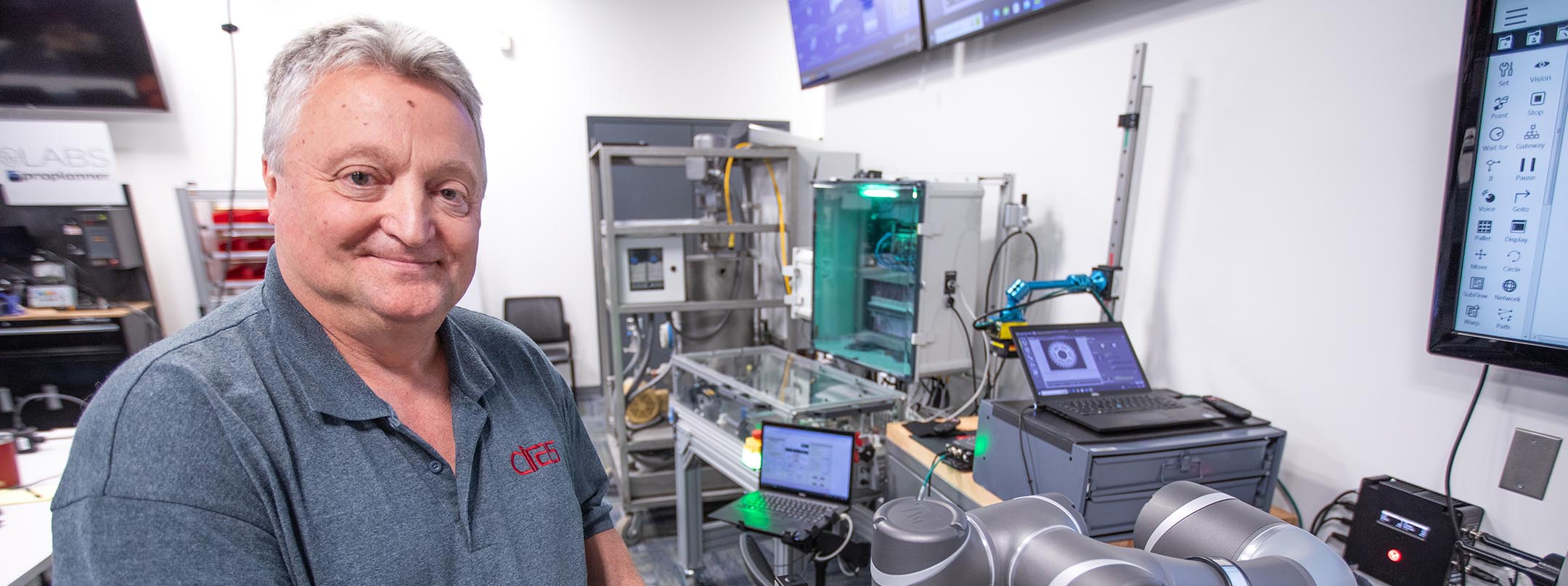Written by Mike Krapfl | Photos by Christopher Gannon
Sept. 17, 2024
Changing the trajectories of Iowa manufacturers

Chris Hill
2024 Award for Achievement in Economic Development in Iowa
Step into the Digital Manufacturing Lab powered by Alliant Energy and it isn't long before Chris Hill is unpacking an exoskeleton.
This model, he explains, straps on like a backpack and with pulleys, cables and levers helps workers lift their arms with 8 pounds of offsetting support. Think about that if your job involves repetitive arm movements eight hours a day.
"Some industry jobs require lifting or holding items that strain the body over time, often leading workers to take something for pain relief," Hill said. "Companies recognize that improving work-life quality is a key for an aging workforce. Using Digital Lab technologies, like exoskeletons, can reduce employee strain and help companies become employers of choice."
Next, he pulls out some wearable sensors. These happen to be ones workers wear on their arms. They capture information about body movements. And they can collect environmental data, such as heat, which can vary widely across a factory floor.
If the data reads hot, maybe companies could install fans or provide longer breaks to take care of workers and boost their productivity.
"These types of wearable technologies do a good job helping companies focus their continuous improvement efforts," said Hill, the director of engineering services and the Technology Assistance Program for the Center for Industrial Research and Service (CIRAS). He leads its manufacturing lab located in the Iowa State Research Park.
Job one: Solve problems
Hill's job is to help Iowa manufacturing companies solve their problems (such as an aging and hard-to-find workforce) and meet their goals (such as higher efficiencies). His work was recognized with a 2024 Award for Achievement in Economic Development in Iowa.
"Chris has had a direct and lasting impact on Iowa," wrote CIRAS director Mike O'Donnell in a nominating letter. "Chris's impact has been felt through direct engagement with companies across Iowa, leadership of new programs and initiatives, and development of staff and students to continue to serve manufacturing in Iowa."
O'Donnell said Hill's 10-year impact added up to contacts with more than 1,000 distinct clients that have reported financial results of nearly $500 million.
Hill, who studied at Iowa State (Bachelor of Science in industrial engineering, 1987; Master of Business Administration, 2000) and has more than 35 years of experience in manufacturing, said the award is great recognition for CIRAS's efforts to help Iowa industries.
"It's a team effort," he said. "No single person is responsible for the economic development benefit to industry. It's a total CIRAS team and partner effort."
Maybe so, but Hill brings energy and enthusiasm to the effort, which he demonstrated throughout a lap around the manufacturing lab that helps companies test and "de-risk" technology solutions.
Would a large-format 3D printer help with a production problem? The lab has printers and expertise to help companies evaluate the idea. Would sensors help companies monitor and maintain electric motors? The lab has sensors and expertise to help companies evaluate the idea.
"We help companies understand options and potentials," Hill said. "We can help them with the what-if."
Rules to work by
Take, for example, WindSmart Systems, a Des Moines company developing new commercial roofing systems. As a startup in 2016, the company sought help developing venting products for its roofs. The company started by sponsoring student capstone projects. That led to talks with CIRAS and an introduction to Hill, wrote WindSmart's Dave Harvey in a nominating letter.
Under time and budget constraints, Hill and his team used 3D printers to produce the company's new vent design for industry testing. When those tests were successful, Hill helped the company make plans to manufacture the vent in Iowa.
"I can honestly say that Chris Hill was the instrumental person in helping WindSmart design a higher performing vent," Harvey wrote. "I continue to be appreciative of CIRAS and the expert and unselfish assistance we continue to receive from Chris Hill, CIRAS and ISU."
Throughout his tour of the manufacturing lab, Hill shared a few of the tenets that guide his work with Iowa companies:
- "Define the problem -- understand the company's pain points and drive to the root causes."
- "What are the options and benefits in making a system a smart system?"
- "Understand the benefits and the limitations of a given technology."
- "Iowa companies need to keep their limited and aging workforce as long as possible."
- "Thriving companies are the key to keeping good jobs in Iowa and building healthy communities."
Then he told the story of how "that little bump" of a small CIRAS interaction can improve a company's success trajectory. Hill and his team like to keep busy engineering those technical bumps and changing trajectories.